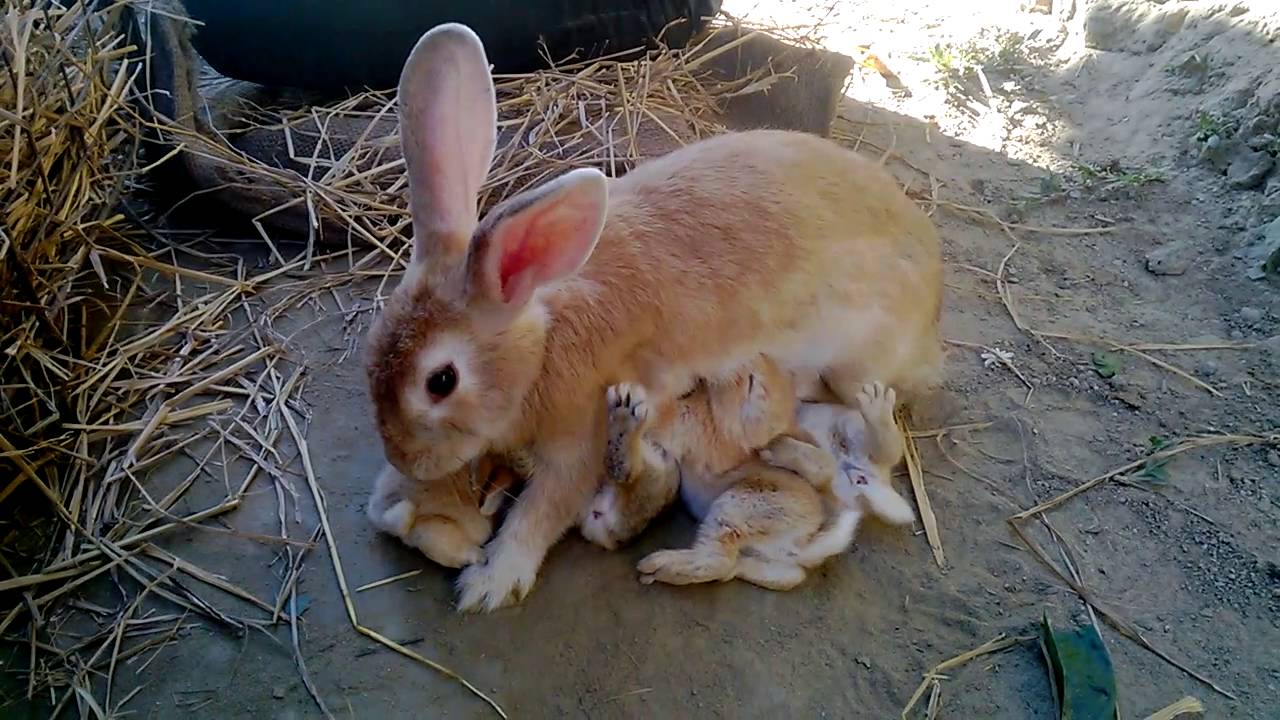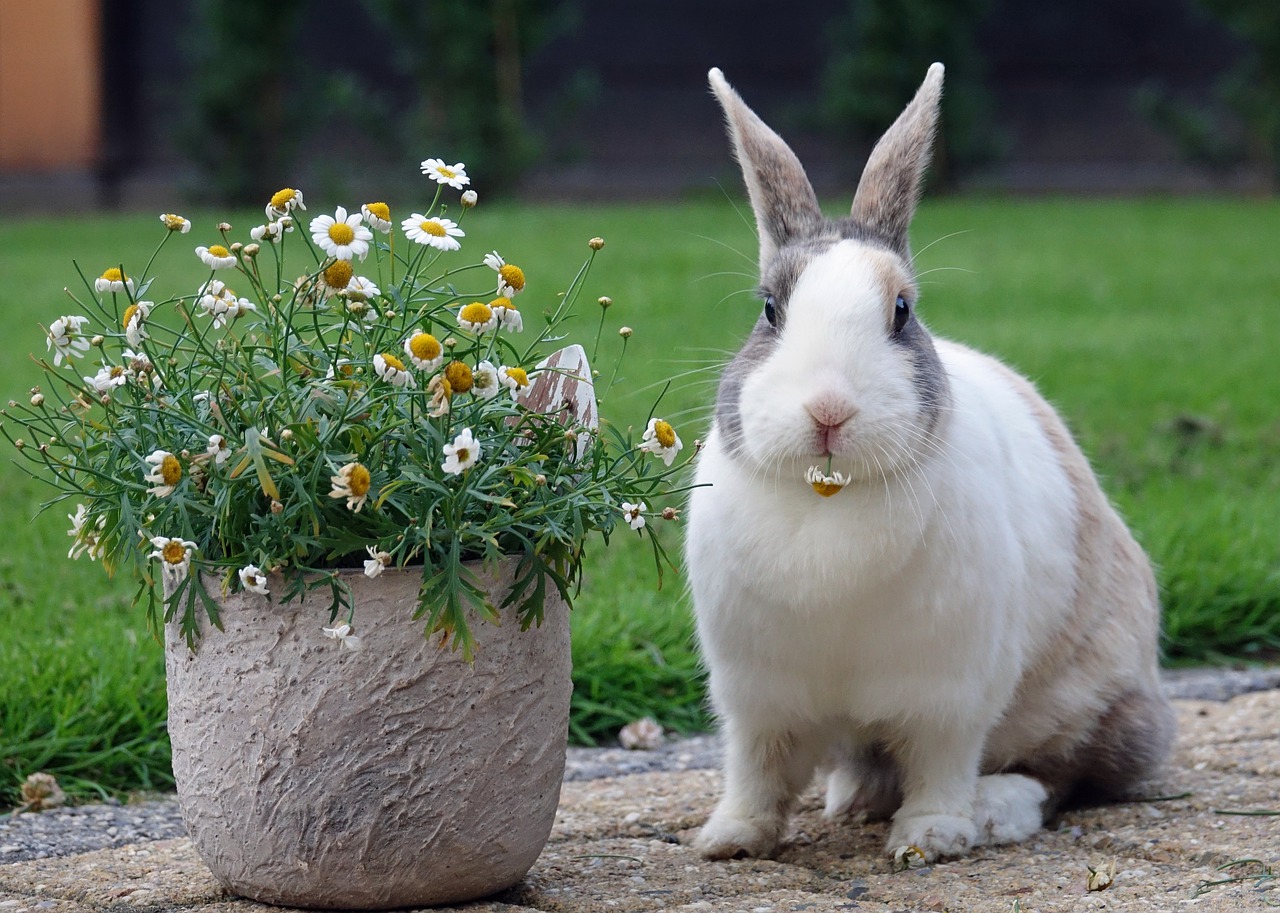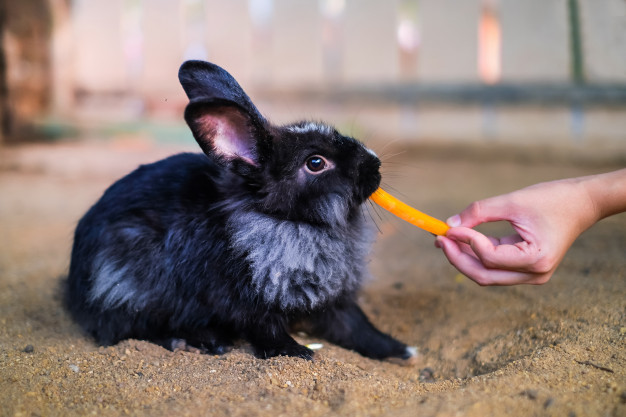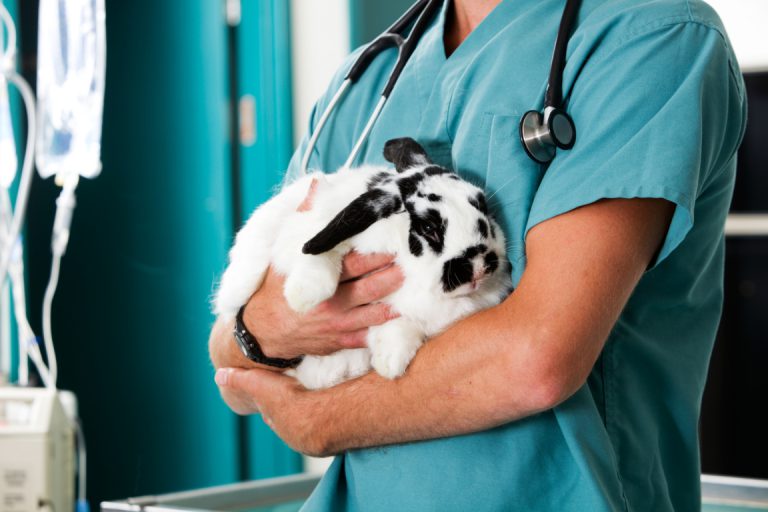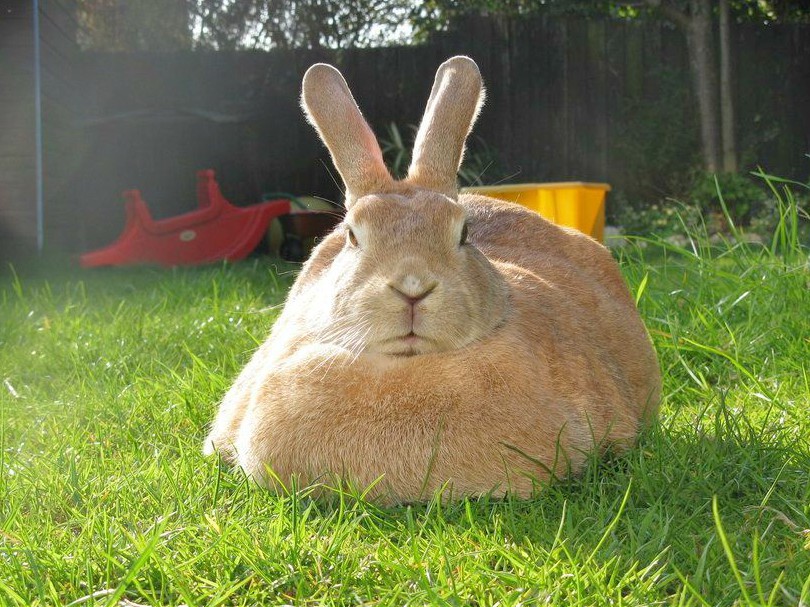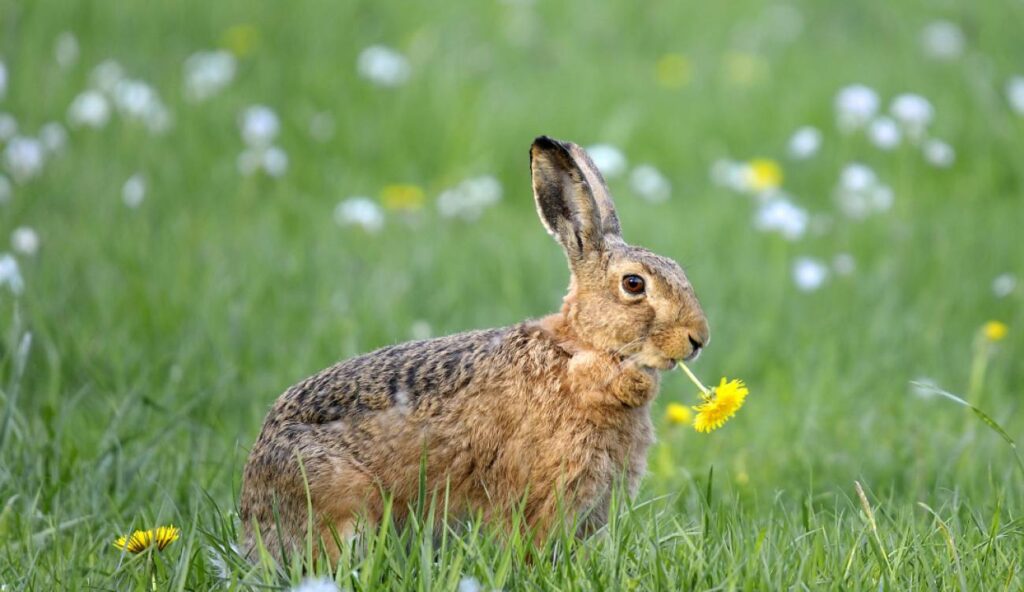Despite what most believe, carrots are not the most appropriate food for rabbits. That is why in this post we invite you to discover what do rabbits eat, what are the proper food portions, plus tips and trivia about these adorable pets.
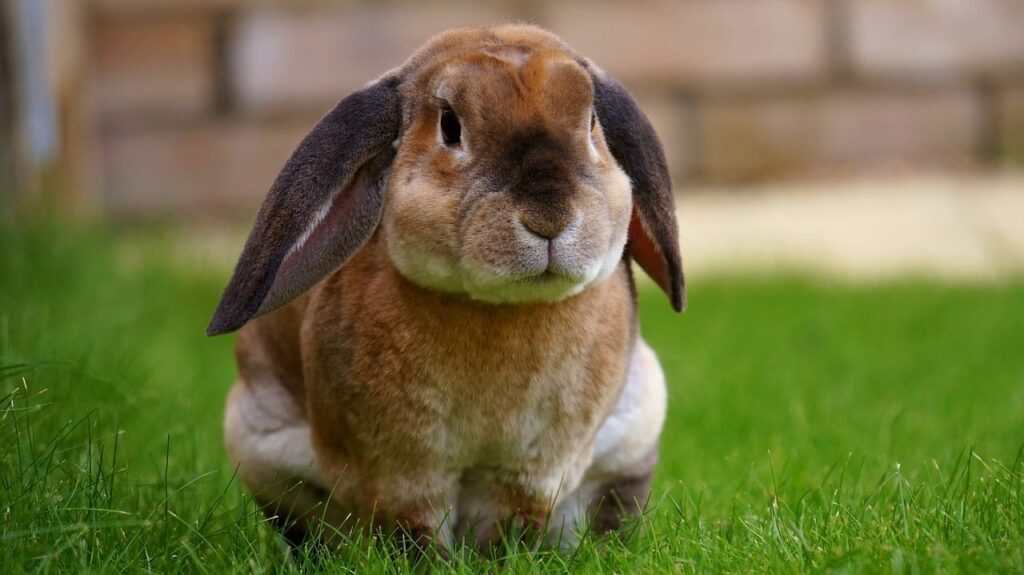
Basic food for rabbits
Undoubtedly, hay is the quintessential food for rabbits and other farm animals, since it represents 80% of their daily intake, both in the wild and in captivity. Due to its high fiber content, it is ideal for maintaining the digestive balance of these wonderful creatures, considering their condition of double digestion.
In addition to hay, the consumption of feed is also important, as well as some vegetables that complement the nutrients they need for optimal growth, preferably those with green leaves.
On the other hand, together with adequate nutrition, these herbivorous animals They require a continuous source of clean and fresh water, which guarantees their adequate hydration.
Necessary food and rations in each of its stages
Although it is important to know what do rabbits eatIn the same way, they are the adequate portions in each of the stages of their life, since this contributes to keeping them free of diseases and general complications in their health.
what do baby rabbits eat
Like all mammals, breast milk is the best and most recommended source of food for an offspring. From birth and during the first 30 days after birth, rabbits cover their nutritional requirement by lactating only once a day for 1 or 10 minutes, which is sufficient because breast milk is rich in fat and protein. Additionally, at this stage, rabbits have slow gastric emptying, which is why they tend to gain weight and grow rapidly.
On the other hand, if due to specific circumstances you adopt a rabbit that is still in the lactating stage, they will ask themselves:what do baby rabbits eat? In this case, it is best to offer goat's milk with a small bottle or syringe, and with the same frequency as the mother, that is, once a day. The plan is to simulate natural breastfeeding, placing the rabbit in a suitable position and stopping when its belly is full.
If you don't have goat's milk, you can give the rabbit commercial milk for baby cats and add a little cream to increase its fat content.
Once this period is over, you can gradually incorporate alfalfa or grass hay into their diet, until weaning is final, since these are considered an important source of calcium and other nutrients, which will prevent malnutrition at an early age.
Approximately between 3 and 4 months of age, small portions of vegetables (around 42 grams per day) can be started, without drastically changing them, as they can cause digestive disorders and diarrhea that lead to dehydration and even death of the rabbit .
Part of these vegetables to start the intake of solid foods can be: artichoke, oatmeal, lettuce, chard, celery, cucumber, coriander, among others. As well as some fruits, to a lesser extent: apple, pear, papaya, mango, strawberry, peach; which must be provided without seeds.
What do adult rabbits eat?
As it is the longest stage of a rabbit's life, we will divide it into two parts:
- Young adults (7 months to 1 year)
It is the ideal time to experiment with different types of hay and define the appropriate diet for the rabbit, as in any process of change, these must be gradual and balanced. Alfalfa should be reduced and replaced with higher amounts of vegetables and fruits.
In females, special attention must be paid during their gestation cycle, since it is only 20 or 30 days. The optimal birth of their offspring will depend on their diet and quality of life.
- Adults (From 1 to 5 years)
During this period, the rabbit must have a varied hay diet and integrate it with a good dose of vegetables suitable for consumption and in moderate portions, always taking care of your pet's sensitive digestive system, as well as permanent hydration.
What do old rabbits eat?
Rabbits can be considered old from 6 years of age, since they have an approximate life expectancy of 9 years. However, there have been known cases of rabbits living healthily for up to 11 years.
How to Live Aligned with Domestic animals, everything will depend on the quality of life offered by their owners, based on adequate nutrition, days of races and games, veterinary control and lots of love.
In this sense, feeding at this stage of their lives can maintain the same scheme as in adulthood, as long as they maintain their physical conditions. Remember to provide quality, fresh and nutritious food. And if your pet begins to lose weight, you can incorporate massive consumption of pellets into its diet, always under the supervision and recommendations of your trusted veterinarian.
Spinach as a food source for rabbits
Commonly people are inclined to offer their rabbits a vegetable in greater proportion, and spinach is one of the favorites. It is recommended for these animals due to its high content of calcium and oxalates (salts), as well as potassium, iron, magnesium, folic acid and a wide variety of vitamins (Vitamin A, Vitamin C, Vitamin K, Vitamin B6 and Vitamin E) , which added to the appropriate intake of water helps to avoid kidney problems.
It should be noted that the stems of spinach contain more fiber than the leaves and in turn the root should be avoided because it has a higher concentration of sugar.
Advantages and Disadvantages in the use of the Conejina
Although many people have doubts, this concentrated food does not have any disadvantages for our beloved rabbits. Unlike other domestic animals, they can be raised for meat production and, in this sense, the rabbit emerged as a food alternative to cover the balanced diet required by this species.
If you do not want to take risks in defining a feeding regimen for your rabbit, the rabbit is an excellent option, as long as it is started after the sixth month of life.
This food has been patented in several countries around the world and is mostly made up of: deactivated soybeans, soybean pellets, sunflower pellets, wheat bran, alfalfa, salt, various vitamins and minerals.
Like the diet based on fresh foods, it should not exceed the number of portions, it should be accompanied by physical activity and a constant source of fresh water.
Foods rabbits should NOT eat
As we mentioned at the beginning, rabbits have a delicate digestive system and, to this extent, we must take extreme care not only what they consume but also the quantities and frequency of them.
Although we are usually attentive to what rabbits eat, it is extremely important to know what kinds of food can be fatal to the health of our pet, since the fact of being herbivores does not mean that they can eat all kinds of vegetables or vegetables because many of them these can be toxic.
Among the fruits and vegetables we have:
- Avocado
- Garlic
- Onion
- Turnips
- Mushrooms
- Green peas
- Bananas
- tomato leaves
- Eggplants
- Papas
- iceberg lettuce
With regard to toxic plants, the best known are:
- ferns
- Poppies
- Laurel
- Yerbabuena
- Belladona
On the other hand, processed foods, saturated in fat or that generate excessive gases should be avoided, which are generally contraindicated for the vast majority of animals, since they will inevitably cause adverse effects to the health of our rabbits. These could be:
- Chocolate
- Cookies
- Bread
- Corn
- Cauliflower
- Nuts
- Cheese
- Butter
- Meat
How to reward your rabbit with food
Whether by training to develop skills, learning coexistence behaviors or a simple socialization process, rabbits can also be rewarded with a treat that contributes to their well-being, their relationship with other species and their human family.
When rewarding our pet, we can resort to stimulation through the demonstration of affection (caresses and nice words) but it is also usually very effective to offer them a treat, a bite of some food that is not part of their usual diet. This treat can be of natural origin, some processed food or a mixture of both.
As an example, we can reward them with a piece of apple or any other recommended fruit, pellets, baked seed bars, vegetable bars with honey, apple wood sticks, among others. However, the physical condition and age of the rabbit should be considered in order to avoid inconveniences in its digestive process.
Diseases and health problems according to what rabbits eat
Regardless of your race, in Dwarf Rabbits, lionheads, holland lop, or any other species, their poor health is usually very evident, since they present dramatic symptoms that something is not right, such as:
• Loss of appetite or difficulty eating
• Weight loss
• Partial or total loss of fur (indistinct from its normal shedding phase)
• Persistent diarrhea
• Watery or irritated eyes
• General decay
• Among others who show a different attitude than usual.
Management
Diseases can be associated with several factors, such as: of viral origin, produced by fungi and bacteria, parasitic, and inherent in their diet.
- Diarrhea
They can be caused by a drastic change in diet or improper handling of food (not washed well or not fresh enough). The greatest risk is severe dehydration.
- coliform infection
Coliforms are groups of bacteria species with certain characteristics that indicate a high level of contamination in water and food. These types of infections cause chronic diarrhea and you should go to the vet immediately to provide an injectable treatment, in order to avoid fatal dehydration for your pet.
Health problems
Although the health problems detailed below are not considered diseases, they are still delicate pathologies inherent to what rabbits eat. These must be attended to in a timely manner to avoid complications that could seriously harm your health and even cause your death.
- Dental overgrowth or malformations
Part of the feeding process of the rabbits must contemplate wood to gnaw, in order to file their incisors (upper and lower), since they grow excessively and can move the jaw backwards, causing the inability to eat and in extreme cases the death by starvation.
- Alopecia
The partial or total loss of the coat, outside of its shedding process, is due to the deficiency of foods that include vitamins and particular nutrients, for which it is recommended to consult the veterinarian and review your pet's diet as soon as possible.
- Obesity
Rabbits, thanks to their insatiable appetite and lack of exercise, tend to be overweight, especially in adulthood, causing serious health problems. The solution is to maintain a healthy diet, avoid excessive or very frequent portions of food and stimulation of outdoor activities (run, jump and play)
- hairballs in the stomach
An unbalanced diet can cause rabbits to suffer from an intestinal obstruction, added to their grooming, since when they lick their hair they gobble it up. The ideal is to brush his coat frequently along with a diet rich in fiber and plenty of hay.
Curiosities and tips to have a healthy rabbit
Starting from a balanced diet, taking great care of what rabbits eat and a lot of love towards our pets, these little ones can accompany us significantly for up to a decade of our lives.
As can be seen with the naked eye, they are small animals, defenseless and willing to give and receive affection, they can become our children's best friend and an ideal companion both in open and confined spaces. In this sense, it is important to take into account:
- In their wild life, rabbits live in groups, so it is suggested to acquire at least one pair so that they always feel accompanied.
- Due to their double digestive process, it is difficult to understand that they eat their own poop, but not all of it, only the cecotropes that contain a large amount of nutrients necessary for their growth.
- Their characteristic ears are not only important for their sense of hearing, but also help them regulate their body temperature.
- They reproduce quickly, their gestation period is just 30 days and they give birth to an average of 7 offspring per litter. Therefore, its sterilization is recommended if you do not want to be filled with rabbits (as they call baby rabbits).
- The kits are born hairless, blind and completely deaf, which shows that they are completely vulnerable and delicate.
- Showers are not part of their cleaning system. In fact, they are not recommended because they cause high levels of stress; It is enough to brush them regularly to avoid excessive intake of hair due to grooming.
- Like other animal species, rabbits are part of the AAT (Animal Assisted Therapy)
- Rabbits have an excellent appetite, so you must be very careful about the quantity and quality of their food, as they tend to be obese
- Remember not only to attend to the cleaning of your pet but also its cage, keep it in optimal conditions to avoid the proliferation of fungi and bacteria that can significantly affect the health of your pet.
- Their teeth and nails never stop growing, so it is important that the vet keeps them filed down and include pieces of wood to gnaw on in their routine, which additionally helps to reduce their stress levels.
